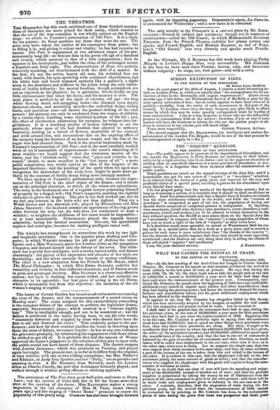THE THEATRES.
THE Haymarket has this week exhibited one of those finished assump- tions of character, the more prized for their rarity, which remind us that the art of the true comedian is not wholly extinct on the English stage : we allude to FARREN'S personation of Old Parr. It is a study for the painter : its finest qualities are those that meet the eye. The actor may have taken the outline of his conception from prints ; but in filling it in, and giving it colour and vitality, he has had recourse to nature. Old Parr is represented at two advanced stages of his pre- ternaturally long life : we first see him in his green old age of a hundred and twenty, which answers to that of a hale octogenarian ; then he appears in his decrepitude, just before the close of his prolonged career, a hundred and forty-eight. The characteristics of these two periods, relatively speaking, are discriminated with the skill of a master. In the first, we see the active, hearty old man, his wrinkled face yet ruddy with health, his eyes sparkling with contented cheerfulness, and his white hair and beard trimmed sprncely like a gallant's, a slight stoop in the shoulders and stiffness in the joints being the only indica- tions of bodily infirmity : his mental faculties, though unimpaired, are not so vigorous as his physical : he is garrulous, dwells fondly on any little circumstance that takes his fancy, and his memory is slow. The next phase is marked by all the signs of extreme old age : the long white flowing beard and straggling locks—the dimmed eyes, deeply farrowed cheeks, and mumbling speech—the enfeebled frame, failing limbs, and querulous tone—all denote the gradual sinking of the vital powers : his memory can only be awakened from the trance of oblivion by a visible object recalling some cherished incident of his life ; and, the effort of recollection exhausting his energies, he relapses into for- getfulness. It is a touching picture of human infirmity to see the patriarch, whose span of life had doubled that allotted to ordinary humanity, doating on a bunch of flowers, unmindful of the clamour and strife around him, and unconscious that on the expiring effort of his memory hang the fortunes of an honest couple and the fate of the rogue who had cheated them. Such is the general impression made by FARREN'S impersonation of Old Parr ; and as the most carefully studied work of art is susceptible of improvement--the actor's admitting of it most readily—we would suggest that the tremulous motion of the limbs, and the " childish treble " voice that " pipes and whistles in its sound," should be more manifest in the "last scene of all" : a more pallid complexion, too, would convey an idea of the languor of the impaired functions ; and the kindling of the spirit when the aged man recognizes the descendant of his early love, might be made more pa- thetic by the contrast of bodily decay being more strongly marked. We have spoken of FARREN'S performance only, because the repre- sentation of Old Parr is the chief object of the drama ; and it stands out as the principal character, to which all the others are subordinate. The story is the hackneyed one of a roguish lawyer possessing himself of property by a forged will ; Old Parr's longevity enabling the rightful claimant to prove the forgery. The plot is not well worked out, nor do we feel any interest in the heirs who are thus righted. They are a Welsh farmer and his shrewish wife, play ed by BUCKSTONE and Miss JULIA BENNETT : the husband assumes an appearance of having grown older between the acts, but the wife does not condescend to wear a wrinkle ; to heighten the shrillness of her tones would be impossible— or at least unendurable. STRICKLAND played the roguish lawyer admirably, bating his farcical mannerism. STUART, his spendthrift nephew and comrogue, becomes the dashing profligate rascal well.


























 Previous page
Previous page